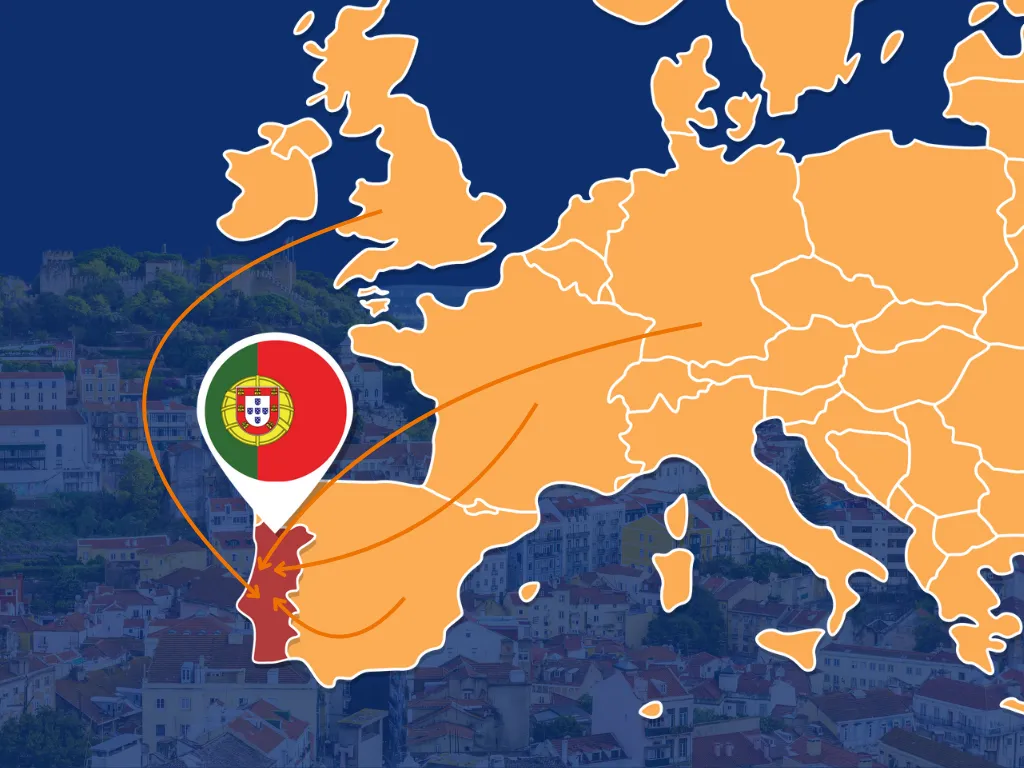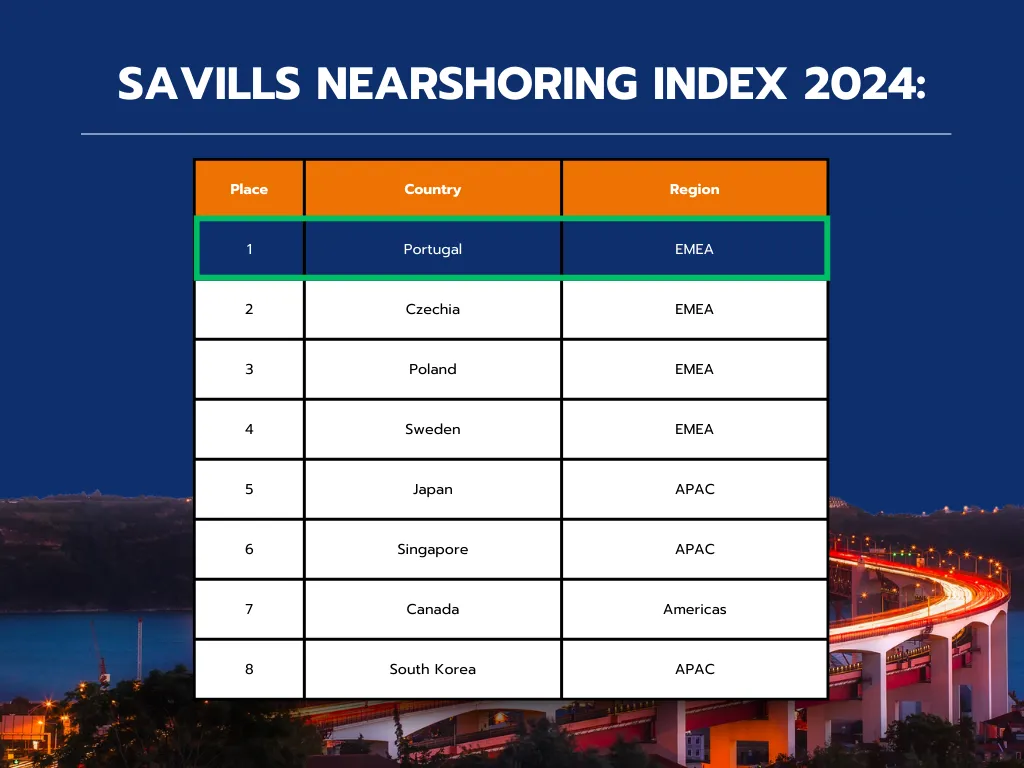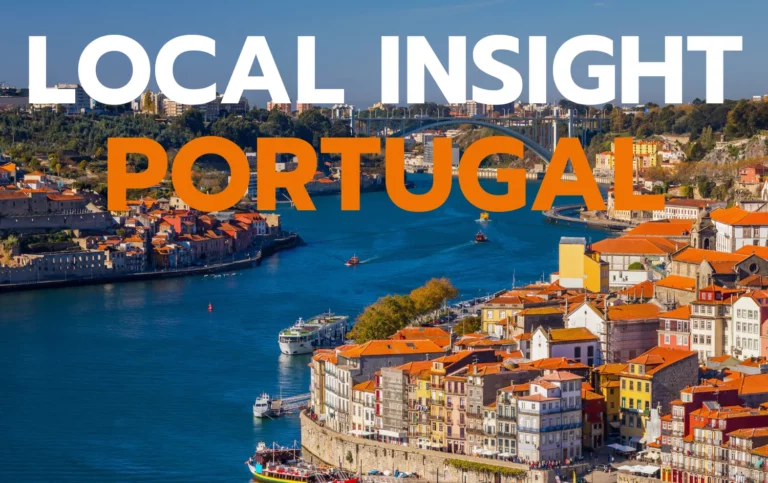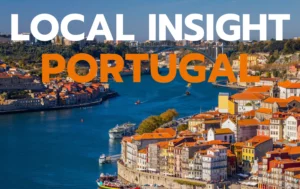Portugal is fast becoming Europe’s premier nearshoring destination, offering 30-40% lower operational costs than France and the UK, a highly skilled multilingual workforce, and government-backed incentives for R&D and tech expansion. With leading companies like Accenture and Volkswagen cutting costs by 15-20% through nearshoring, Portugal presents a compelling opportunity for businesses looking to optimize supply chains and scale operations efficiently.
Why is Portugal a Strategic Nearshoring Destination for Europe?
Geographic Advantage
Located in Western Europe, Portugal’s central position provides an ideal gateway for companies looking for nearshore partners on the European markets. The city of Lisbon, its economic center, is only a few hours by plane from all the major European capitals,considerably reducing travel delays. In addition, Portugal GMT/GMT+1 time zone, allows it to be aligned with its French neighbors for example, enabling local companies to communicate more easily with their European partners. A significant advantage that facilitates trade and overall productivity, as the country has access to growing tech hubs such as the United States and Brazil.

Skilled Workforce
Portugal has firmly established itself as a talent hub, offering a skilled, adaptable, and globally connected workforce. The Portuguese government has taken proactive steps to remove barriers to entry for international professionals, including streamlining the recognition of foreign qualifications. This initiative, coupled with targeted training programs aligned with the country’s labor market needs, ensures a steady flow of skilled workers into the Portuguese workforce. According to EURES (European Employment Services), the country’s IT sector has become a significant driver of employment, with IT professionals accounting for19% of the total employed population in the first quarter of 2023. Additionally, Portuguese professionals are renowned for their multilingual capabilities, excelling in languages such as English, Spanish, French, and German, which facilitates seamless communication with international clients and enhances Portugal’s appeal as a top nearshoring destination.
Business Environment
Portugal’s growing attractiveness to businesses is also due to the government’s political will to implement supportive policies and a solid economic outlook. Initiatives such as the TechVisa program and tax incentives for R&D activities have created a thriving environment fortech companies and startups, attracting businesses from around the globe. According to Savills’ Nearshoring Index 2024, Portugal ranks first as the top nearshore location in the EMEA region, underscoring its appeal for international operations. Furthermore, a Savills study projects Portugal’s GDP growth at 1.2% in 2024 and 1.8% in 2025, highlighting the country’s economic stability and potential for sustained development. These factors solidify Portugal’s position as a prime nearshoring destination.

Digital Infrastructure
The digital landscape of Portugal is a testament to its commitment to connectivity and innovation. As highlighted in DE-CIX’s study “Portugal: A Global Interconnection Hub, a gateway to Europe, a gateway to the World,” the country serves as a vital link between Europe and the rest of the world. In 2023, Portugal ranked third in Europe for Fiber to the Home/Building (FTTH/B) penetration, reaching 71.1%. Additionally, by early 2024, Portugal hosted 33 data centers, with 20 concentrated in or near Lisbon. This robust digital infrastructure positions Portugal as a critical player in the global technology ecosystem.
Industry Highlights: Key Sectors Thriving in Portugal
According to Commission forecasts, Portugal’s GDP could grow by 1.9% in 2025 and 2.1%in 2026, against EU averages of 1.5% and 1.8% respectively. This sustained momentum underlines a remarkable five-year economic convergence cycle for Portugal, one of the longest in the Union. Furthermore, Eurostat data show that since 2016, excluding theCOVID-19 pandemic years, Portugal has consistently grown above the EU average. This suggests a potential convergence period of ten years, which will strengthen its position as one of the best-performing countries in the bloc.
- Tourism: Over the last few decades, the service sector has grown considerably to become one of the country’s leading sectors, especially tourism. In 2021 according to INE Portugal hosted 9.6 million foreign guests this marked, a substantial 48.4% growth over 2020numbers but stood well below pre-pandemic levels.
- The digital sector: Portugal’s digital sector is booming. Every year, millions of digital nomads choose Portugal because of its advanced telecoms, startup creation and tax incentives. Lisbon’s WebSummit attracts technology enthusiasts and has encouraged digital nomads to settle in Portugal since 2016.
- Renewable energies: The Portuguese government plans to dedicate 60 billion euros to renewable energies through the upcoming years, making up 25% of their national economic production. The country’s global energy production will reach 70% thanks to wind power and hydroelectric systems by early 2023.
- Saúde e Biotecnologia: Portugal supports a thriving community of startups developing artificial intelligence-based medical tests, as well as telemedicine and big data solutions in the healthcare sector. Sword Health for example, has established itself as a leader in digital musculoskeletal therapy, gaining worldwide popularity. Biovance Capital on the other hand uses a €51 million find to support early-stage European biopharmaceutical companies,including those based in Portugal. The fund invests to demonstrate why healthcare is playing a larger role worldwide.
Opportunities in Nearshoring in Portugal
As European enterprises refine their operational strategies, Portugal is emerging as an underutilized nearshoring powerhouse. While commonly praised for its competitive laborcosts and geographic proximity, Portugal offers several untapped advantages that are especially pertinent to businesses from France, Spain, and the UK.
Secondary Hubs with Strategic Incentives
Most foreign firms gravitate toward Lisbon and Porto. However, lesser-known hubs such as Braga, Aveiro, and Coimbra provide not only cost efficiencies but also access to world-class research institutions and government-backed incentives. These cities are rapidly evolving into technology and industrial clusters, boasting specialized talent pools at a fraction of the cost of primary markets.
- Braga: An emerging AI and robotics hub with top-tier research facilities.
- Aveiro: A center for IoT and smart city solutions, benefiting from Portugal’s 5G expansion.
- Coimbra: A biotechnology and health-tech nucleus, driven by one of Europe’s oldest universities.
Portugal as a Gateway to the Lusophone Market
Portugal provides preferential trade access and business facilitation to the €2.5 trillion Lusophone market, including Brazil, Angola, and Mozambique. Companies expanding through Portugal gain a competitive edge in these high-growth markets, bypassing complex bureaucratic barriers that firms entering directly may face.
Cybersecurity & Data Sovereignty Compliance
With tightening EU regulations on data protection (GDPR, AI Act, NIS2 Directive),Portugal is positioning itself as a “safe zone” for IT security and cloud operations. Foreigncompanies, particularly those in fintech and health-tech, are establishing compliance-drivenIT hubs in Portugal, leveraging low cyber risks, competitive operational costs, andadvanced digital infrastructure.
Ultra-Low-Cost Renewable Energy for Industrial Nearshoring
Energy-intensive industries such as semiconductor manufacturing, metallurgy, and EV battery production are shifting toward Portugal due to its unparalleled access to low-cost,renewable energy. The government has committed €60 billion to renewable initiatives,ensuring that businesses can achieve sustainable operations while maintaining costefficiency.

Challenges and Solutions in Nearshoring to Portugal
Challenge: Competition for Skilled Talent
Solution: Establishing long-term partnerships with local universities and research institutes ensures a steady talent pipeline. Companies can also leverage Portugal’s government-backed workforce training programs to upskill employees.
Challenge: Cultural and Organizational Integration
Solution: A structured onboarding and mentoring program for international teams canbridge cultural gaps, improving retention and operational efficiency.
Challenge: Bureaucratic Navigation
Solution: Leveraging Portugal’s streamlined foreign investment programs and working with legal and regulatory specialists mitigates administrative bottlenecks and accelerates time-to-market.
Success Stories of Nearshoring in Portugal
Accenture
Accenture opened a service center in Portugal, reducing operating costs and connecting them to skilled technical experts from the region. According to their reports, cost optimization and reduced time-to-market resulted in savings of up to 20% on IT and R&D service costs.
Volkswagen
To access its target workforce Volkswagen established production lines for electronic components in Portugal. This initiative has cut production costs by 15%, while improving delivery times thanks to greater proximity to European markets. In 2022, Portugal had one of the highest business formation rates in the EU, with 16.7% of new companies created compared to the size of its market. This highlights the country’s dynamic entrepreneurial environment, contributing to the overall strength of the EU’s business ecosystem.
The Future of Nearshoring in Portugal
The Next Phase: Portugal as a Testing Ground for AI & Robotics
Few realize that Portugal is evolving into an R&D sandbox for AI-driven automation. With government-backed initiatives and university collaborations, nearshored teams can develop, test, and deploy AI-powered robotics, supply chain automation, and predictive analytics models in a regulatory-friendly environment before scaling to larger EU markets.
Nearshoring for Deep-Tech and Space Industries
Portugal is quietly fostering space technology and deep-sea exploration. The Azores and Sines are becoming strategic points for space launches and satellite technology. Foreign firms that nearshore to Portugal can tap into the Atlantic International Research Center, akey initiative driving space innovation and satellite data commercialization.
Portugal’s Role in European Defense & Cybersecurity Nearshoring
With heightened geopolitical risks, the European Commission is increasing defense-related nearshoring within EU borders. Portugal’s government is actively positioning itself as a secure nearshoring destination for defense tech, cyber security firms, and critical infrastructure projects.
Conclusion
To conclude, Portugal offers very favorable conditions to European companies looking to optimize their operations and supply chains within the EU. The country was highlighted in the “Nearshoring Index 2024” as an attractive destination for industrial activities, leveraging energy independence and renewable energy integration to support sustainable business operations.
European companies are increasingly choosing Portugal for their manufacturing and tech operations, minimizing transport costs while reducing dependency on volatile regions.
Curious about how Portugal could be a game-changer for your business? Let’s explore the possibilities together !








